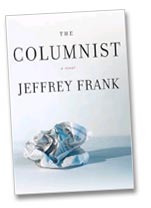In populist demonology, the term "Washington" is so self-evidently synonymous with badness that it hardly requires an explanation. Everyone is supposed to understand that our nation's capital is a hopelessly corrupt and corrupting place, a den of thieves, a colony of leeches with name tags that say "lobbyist," "talking head," "spin doctor," and "professional politician." These bloodsuckers live it up while squandering our hard-earned tax dollars. For sport, they engage in partisan bickering, reciprocal back-scratching, as well as in the more traditional forms of vice.
But don't worry about all that. According to two new books, one a personal essay, the other a satirical novel, the reality of our nation's capital is actually much more squalid. In the view of Meg Greenfield and Jeffrey Frank, a lot of people who live in Washington, D.C., resemble human beings only in outward appearance. Parasitism is the least of their deficiencies.

Greenfield, the widely admired editorial page editor of the Washington Post who died in 1999, makes this point explicitly in her posthumous memoir-critique, Washington. The book wasn't finished when Greenfield died, and in places it could have used another pass through the typewriter. Nonetheless, she gets across her central assertion clearly and pungently. The public may sometimes object to Washington for the wrong reason, but its attitude of contempt is eminently justified.
In Greenfield's view, Washingtonians dehumanize themselves in a number of ways: by leaving their individuality and natural human sympathies wherever they came from (and hope never to return to), by setting impossible standards for themselves and others, and by putting their careers ahead of their families and personal lives. Even adultery is pathetic in Washington. Politicians are too busy and emotionally guarded to carry on passionate extramarital affairs. Instead, they're more likely to seek out emotionally empty quickies with mentally inert bimbos. For male politicians, meaningful relationships with members of the opposite sex are reserved for chiefs of staff and administrative assistants. With a keen anthropological eye, Greenfield sketches a catalog of recognizable and unappealing Washington types--the "adult good child," the prodigy, the perpetual protégé. She is especially astute in her chapter of observations about the "wife culture" that lasted much longer in Washington than anywhere else in the country.
Why do Washingtonians lead lives of such superficiality and emotional impoverishment? Greenfield's explanation is that they become "dual selves" leading a "two-track" existence. As she writes, "The public, blah-blah-blah-I'm-glad-you-asked-that-question person lives in the same skin with the other one, who acknowledges in a hundred different ways to a multiplicity of large and small Washington audiences every day what a crock he knows the blah-blah-blah to be." Though she blames those who undergo this kind of personality schism, she views it as almost unavoidable. In Washington, politicians, aides, and journalists are expected to lead blameless, exemplary lives of absolute dedication to causes and constituents. But no one is perfect or blameless in reality. So Washingtonians bifurcate into a fraudulent "on-the-record" self and a more genuine "off-the-record" one.
Over time, the perfect self cannot be kept separate from the flawed one. Greenfield observes that it is the ideal personality that most often comes to subsume the genuine one. Washington types "begin to live lives of pantomime, in which gesture is all," she writes. "They spend more and more time attending social functions with 'friends' they don't much like, smiling when they want to frown or yell or tell someone off." Living the lie of a carefully cultivated public image, keeping up a false picture makes someone truly lifeless. Eventually, she writes, such a person will "address us over a casual drink or at the supermarket as if he were orating at the United Nations."
The moments Greenfield savors are those in which the reverse of this process occurs--when the real human being rises to reassert itself, cracking the carefully constructed carapace of a public image. When the claims of family, identity, and personal history reassert themselves, Washington's ego-monsters become far more sympathetic creatures. Greenfield writes of being moved listening to the rambling speech Nixon gave about his parents on the morning of his resignation in 1974. Colleagues in the Washington Post newsroom took this as another shameless gambit by a cynical manipulator. To Greenfield, however, "it seemed most natural that at a moment of such unendurable shame, one's thoughts would go back to one's parents, to one's anxieties about how they would view the spectacle, to indirect pleas for their forbearance and love."
She reserves her true admiration for those few who live in Washington and yet manage to resist the tendency to adopt a dual selfhood. Among the few she names are the late Phil Hart of Michigan, the retired Nancy Landon Kassebaum of Kansas, John McCain of Arizona, and many of the journalists she worked with at the Post. Though anyone who knew her would place Greenfield herself in the category of grounded, fakery-proof Washingtonians, it's a measure of her integrity that she does not exempt herself from her own analysis. In several brief but revealing autobiographical discursions, Greenfield describes herself, especially in her younger days, as one of those "adult good children" who flourish in Washington but are largely detested elsewhere. She exposes her own feelings of shame about instances when she wielded her power as a journalist with too little consideration for the feelings of others.

Jeffrey Frank, a former colleague of Greenfield's at the Washington Post and now an editor at The New Yorker describes Washington during roughly the same era that Greenfield covers in his slight, amusing satire The Columnist. The novel takes the form of a faux-memoir by the syndicated columnist Brandon Sladder. Sladder seems to be modeled in equal proportions on Joseph Kraft and George Will. He pompously misquotes great writers, wears a bow tie, and natters on about baseball, comparing Israel to the '69 Mets and describing Margaret Thatcher as "surefooted shortstop who seems to be fielding line drives." Sladder pens his tell-all confession in the orotund style of the world affairs columnist of yore, a tone Frank sends up splendidly. Looking back on his career, Sladder laments the "people I wish I'd seen more of, such as my children."
Sladder is a twit, a suck-up, a blackmailer, and a buffoon who makes his way as a journalist by betraying his parents, wives, children, friends, and colleagues. After destroying a liberal weekly modeled on the New Republic and making an enemy of its literary editor "Lionel Heftihed," he goes on to wreck havoc elsewhere. His ambition and superficiality leave a swath of destruction, which he largely ignores or blames on others. "If one took seriously all that is said about oneself," Sladder notes, "it would not be possible to function in this town."
Beneath the comedy, Frank--who, as Brandon Sladder would say, has the good fortune to call me a friend--takes an even dimmer view of Washington society than does Greenfield. Her inside-the-Beltway types sacrifice their real lives on the altar of political celebrity. His characters, by contrast, are such deeply terrible people that they never had a real life to sacrifice. Sladder's friends and family are but the props and tools of career advancement.
Despite her attention to comic detail, Meg Greenfield sees Washington as a largely tragic place because of the way it makes people less human. Jeffrey Frank sees Washington as ridiculous and funny for the same reason. Her book is a subtle, thoughtful, and ultimately compassionate depiction. His book is thinner, less generous, and more fun. Together they'll make you glad if you make your home somewhere else.